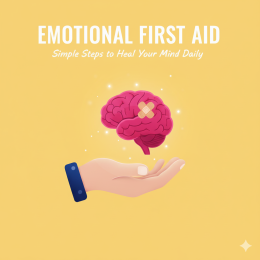
Emotional First Aid: Simple Steps to Heal Your Mind Daily
2025-10-16 15:36:10If you cut your finger, you don't ignore it - you wash it, apply medicine, and cover it with a bandage.
But what happens when you experience emotional pain - rejection, failure, loneliness, or stress?
Most people try to move on without healing, letting invisible wounds deepen over time.
Just like physical health, mental and emotional well-being also need first aid - gentle, everyday actions that help you recover, rebalance, and build resilience.
At CIIMHANS (Central India Institute of Mental Health and Neuro Sciences, Raipur), we believe that emotional care should be a daily habit, not just a reaction to crisis.
What Is Emotional First Aid?
Emotional First Aid refers to simple, practical steps that help you respond to emotional pain, stress, or trauma just as physical first aid helps with physical injuries.
It's about catching emotional distress early before it turns into a deeper mental health issue like depression or anxiety.
Some common situations that call for emotional first aid include:
Facing rejection or heartbreak
Experiencing failure at work or studies
Feeling isolated or lonely
Going through grief, stress, or burnout
Struggling with self-esteem or guilt
These emotional wounds may not bleed - but they hurt just as deeply and deserve attention and care.
Why Emotional First Aid Matters
Ignoring your emotions can be as dangerous as neglecting physical wounds. When emotional pain is left untreated, it can lead to:
Chronic stress and anxiety
Sleep problems or fatigue
Relationship conflicts
Poor focus and low productivity
Risk of depression and burnout
Practicing emotional self-care daily helps:
Build emotional resilience
Regain focus and motivation
Strengthen relationships
Improve overall mental well-being
At CIIMHANS, Raipur, our therapists often emphasize that Healing begins with awareness. When you recognize your pain, you can begin to treat it - not hide it.
Simple Steps to Practice Emotional First Aid Daily
1. Acknowledge Your Emotions - Don't Suppress Them
Pretending to be okay when you're not only adds pressure.
Take a moment each day to check in with your feelings, sadness, anger, frustration, joy and allow yourself to feel without judgment.
Ask yourself: What am I feeling right now? Why?
2. Talk It Out - Express, Don't Bottle Up
Sharing your thoughts with someone you trust can be incredibly healing. Whether it's a friend, family member, or therapist talking helps release emotional tension.
At CIIMHANS, we offer confidential counselling sessions where you can express freely, gain perspective, and learn coping strategies.
3. Challenge Negative Self-Talk
Emotional wounds often grow from the inside - fuelled by harsh self-criticism.
Replace I'm failed with I'm learning.
Replace I'm not enough with I'm growing every day.
Positive self-talk rewires your brain for confidence and resilience.
4. Take Mindful Breaks
Pause. Breathe. Stretch.
Even 10 minutes of mindfulness or deep breathing daily can calm your nervous system and reset your emotional balance.
Try this mini-exercise:
Close your eyes. Inhale deeply for 4 seconds. Hold for 2 seconds. Exhale slowly for 6 seconds.
Repeat this three times whenever you feel overwhelmed.
5. Create an Emotional Toolkit
Just like a physical first aid kit, create your emotional toolkit - things that make you feel safe, calm, and grounded.
Your emotional toolkit can include:
Journaling or writing down your thoughts
Listening to soothing music
Spending time in nature
Talking to a therapist
Practicing gratitude
6. Set Healthy Boundaries
Saying no is not selfish - it's self-care.
Boundaries protect your mental energy and prevent emotional exhaustion.
If you feel drained by constant demands, give yourself permission to step back and recharge.
7. Seek Professional Help When Needed
Sometimes, emotions can feel too heavy to manage alone. And that's okay.
Reaching out to a mental health professional doesn't mean you're weak - it means you're brave enough to heal.
At CIIMHANS, Raipur, our team of psychiatrists, psychologists, and counsellors provide:
Therapy for anxiety, stress, and depression
Relationship and family counselling
Grief and trauma management
Sleep and behavioural therapy
Rehabilitation and mental wellness programs
Your emotional wounds deserve the same care as your physical ones - and we're here to help.
Daily Emotional Healing Habits
Here are some daily practices that strengthen emotional wellness:
Start your day with gratitude
Practice meditation or yoga
Limit screen time
Eat nourishing food
Spend time outdoors
Connect with positive people
Sleep 7-8 hours
Small steps can bring big emotional healing when done consistently.
When to Seek Emotional Help
If you notice these signs frequently, it's time to seek help:
Persistent sadness or irritability
Feeling emotionally numb or empty
Difficulty focusing or making decisions
Frequent anxiety or panic attacks
Trouble sleeping despite tiredness
Early therapy and emotional awareness can prevent long-term issues like burnout, depression, or chronic stress.
Final Thoughts
Your emotional health shapes your thoughts, relationships, and quality of life.
Practicing emotional first aid daily is not just about healing pain - it's about nurturing your inner peace, strength, and resilience.
So next time your heart feels heavy or your mind feels tired - pause, breathe, and give yourself the care you deserve.
Because your emotions matter, and healing begins with awareness.
CIIMHANS Central India Institute of Mental Health and Neuro Sciences
Location: Dewada, Raipur, Chhattisgarh
Website: www.ciimhans.com
Email: info@ciimhans.com
Services: Counselling, Therapy, Rehabilitation, Stress & Trauma Care, Mental Wellness Programs
